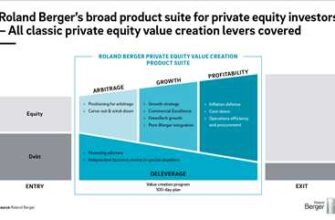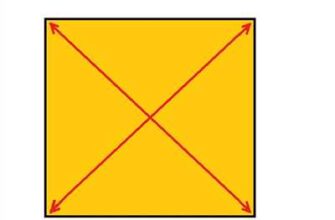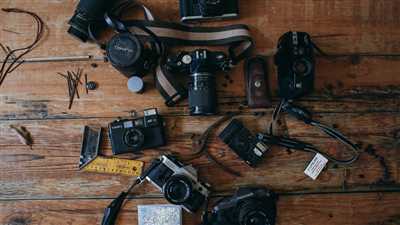
If you have a passion for capturing moments and want to develop your photography skills, then this article is for you. Photography is an art that takes time, practice, and dedication to master. In this guide, we will explore some essential steps to help you kick start your journey in photography.
- 1. Understand the basics
- 2. Get the right equipment
- 3. Practice, practice, practice
- 4. Find a mentor
- 5. Expand your knowledge
- 6. Build your portfolio
- 7. Earn income from your passion
- How To Start a Career in Photography while Staying at Home
- Table of Contents
- How To Get Into Professional Photography
- 1 Familiarize Yourself with Your Camera
- 2 Find Your Mentor
- 3 Take A Photography Course
- 4 Expand Your Network – Create A Portfolio
- 5 Check Your Lighting Mind Your Composition
- 6 Pick The Perfect Background for Your Subject
- 7 Practice
- – Find inspiration To Kick Start Your Photography
- Conclusion: Photography for Beginners
- Sources
- Videos:
- How to Make PHOTOGRAPHY Your CAREER
1. Understand the basics
The first thing you need to do is to understand the fundamentals of photography. This includes learning about composition, lighting, and how to use your camera effectively. There are many books, videos, and online courses available that can help you learn these techniques.
2. Get the right equipment
While it is possible to start with a basic camera, investing in a professional camera will greatly affect the quality of your photos. It is important to pick a camera that suits your needs and budget. You will also need to purchase a range of lenses, tripods, and other accessories to expand your skillset.
3. Practice, practice, practice
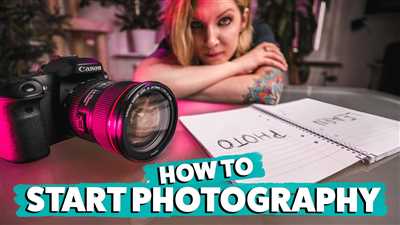
Once you have the necessary knowledge and equipment, it’s time to start practicing. The more you practice, the better you’ll become at capturing the perfect shot. Find inspiration in the world around you and take every opportunity to go out and shoot. Create a portfolio of your best work and seek feedback from experienced photographers.
4. Find a mentor
Learning from experienced photographers can help you accelerate your learning process and gain valuable insights. Look for photographers in your area who offer mentorship programs or workshops. Networking with other photographers will also help you stay motivated and inspired.
5. Expand your knowledge
Photography is a field that is constantly evolving. Stay up to date with the latest trends, techniques, and equipment by reading photography books, watching online tutorials, and attending workshops. The more you learn, the more you can grow as a photographer.
6. Build your portfolio
A strong portfolio is essential for any aspiring photographer. It showcases your best work and helps potential clients or employers understand your style and skill level. Focus on creating a diverse portfolio that demonstrates your range and expertise.
7. Earn income from your passion
Once you have developed your skills and built a strong portfolio, you can start earning income from your photography. There are various avenues you can explore, such as selling prints, doing photoshoots for clients, or working as a full-time photographer. Check out different pricing models and find what works best for you.
In conclusion, starting a career in photography requires time, dedication, and continuous learning. By following these steps, you will be well-equipped to begin your photography journey and pursue your passion for capturing beautiful moments.
How To Start a Career in Photography while Staying at Home
Starting a career in photography can be an exciting and fulfilling journey. With the advancement of technology and the availability of resources, it is now easier than ever to learn and practice photography skills from the comfort of your own home. Here are some steps to help you kick-start your photography career:
- Educate Yourself: Begin by familiarizing yourself with the basic concepts of photography. There are plenty of online courses and videos available that can teach you the fundamentals such as camera settings, lighting, composition, and editing.
- Create a Skillset: Practice is crucial in developing your photography skills. Take your camera and start taking photographs of various subjects. Experiment with different angles, lighting, and settings to expand your creative abilities.
- Network with Other Photographers: Join photography communities and connect with like-minded individuals. Engaging with experienced photographers can provide invaluable insight, inspiration, and mentorship.
- Build a Portfolio: As you gain experience and improve your photography, start curating a portfolio of your best work. Showcase your talent and unique style to potential clients or employers.
- Find Your Niche: Decide on the type of photography you want to specialize in. Whether it’s landscape, portrait, fashion, or product photography, focusing on a specific niche will help you establish a strong brand.
- Get Ready and Start Shooting: Once you feel confident in your skills and have built a solid portfolio, you can start actively seeking opportunities to earn money through photography. This can include freelancing, selling prints, or working with clients.
In conclusion, starting a career in photography while staying at home is now more accessible than ever before. By taking advantage of the wealth of online resources and practicing consistently, you can develop the necessary skills, network with other photographers, and create a portfolio that showcases your unique style. With time, dedication, and passion, you can turn your love for photography into a fulfilling full-time career.
Table of Contents
1. How to Start Photography
2. Finding the Perfect Camera
3. Understanding Lighting and Composition
4. Building a Portfolio
5. Practicing and Improving Techniques
6. Taking Your Photography to the Next Level
7. Expanding Your Network and Finding Mentors
8. Finding Motivation and Inspiration
9. Generating Income Through Photography
10. Taking the Leap into a Full-Time Photography Career
11. Recommended Reading and Courses
12. Conclusion
How To Get Into Professional Photography
If you want to develop your photography skills and become a professional photographer, you’ll need to put in the time and effort to learn and practice the craft. Here’s a step-by-step guide to help you get started:
1. Get familiar with your camera: Before you dive into professional photography, it’s essential to understand how your camera works. Read the instruction manual, watch tutorial videos, and familiarize yourself with all the features and settings.
2. Take courses or workshops: To kick-start your photography journey, take up beginner-friendly courses or workshops. These classes will teach you the basics of photography, including composition, lighting, and subject selection.
3. Expand your skillset with books and reading materials: Reading books written by experienced photographers can provide you with valuable insights and inspiration. Some of the best books for beginners include “The Photographer’s Eye” by Michael Freeman and “Understanding Exposure” by Bryan Peterson.
4. Practice, practice, practice: The key to becoming a skilled photographer is to practice regularly. Take your camera with you wherever you go and capture photographs of different subjects and scenarios. The more you shoot, the better you’ll get.
5. Create a portfolio: As you start taking photos, create a portfolio to showcase your work. This will help you attract potential clients or employers and demonstrate your skills and style.
6. Find a mentor: Having a mentor can greatly accelerate your learning and provide valuable feedback and guidance. Look for experienced photographers who are willing to share their knowledge and offer constructive criticism.
7. Network with other photographers: Building connections within the photography community can open up opportunities and collaborations. Attend photography meetups, join online forums, and participate in exhibitions or photo contests.
8. Earn income from photography: While you’re still honing your skills, you can start earning income from photography by taking on small gigs or freelance assignments. This will help you gain experience and build a reputation for yourself.
9. Stay updated with the latest trends and technology: The field of photography is constantly evolving, so it’s essential to stay updated with new techniques, equipment, and editing software. Subscribe to photography blogs, follow industry professionals on social media, and attend workshops or conferences.
In conclusion, starting a career in professional photography requires a combination of technical knowledge, practical experience, and creative vision. By following these steps, you’ll be on your way to becoming a successful professional photographer.
| Useful resources: |
|---|
| 1. – Find photography books and gear |
| 2. Online courses – Check out platforms like Udemy or Coursera for photography courses |
| 3. Photography blogs and websites – Read articles and tutorials for inspiration and tips |
1 Familiarize Yourself with Your Camera
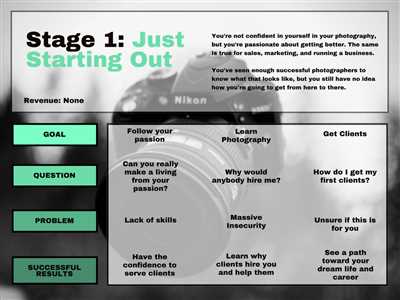
Before you can dive into the world of photography and start capturing stunning images, it is essential to familiarize yourself with your camera. Understanding the capabilities and settings of your camera will help you make the most out of your equipment and take better photographs.
Start by reading the user manual that comes with your camera. It may seem like a tedious task, but gaining a solid understanding of the different buttons, dials, and menu options will give you the knowledge and confidence to use your camera effectively.
While studying the manual, also take the time to experiment with the various settings and modes. Try adjusting the aperture, shutter speed, and ISO to see how they affect the exposure and overall look of your images. Take test shots in different lighting conditions to get a feel for how your camera performs in various situations.
In addition to understanding your camera, it’s crucial to learn about composition and photographic techniques. Composition refers to how you arrange the elements within your frame to create visually appealing and impactful images. Learning about the rule of thirds, leading lines, and other composition techniques will help you create more visually pleasing photographs.
There are many resources available to help photographers develop their skillset. Check out books, online courses, and videos that can provide valuable insight and guidance. Websites like Amazon offer a wide selection of photography books that cover everything from the basics to advanced techniques.
| Source | Link |
|---|---|
| Amazon | www.amazon.com |
Expanding your knowledge will not only help you improve your photography skills, but it will also open up opportunities for networking and finding work in the field. You could pursue photography as a full-time career or earn some extra income by taking on photography gigs. There are many photographers out there who started as hobbyists and eventually turned their passion into a profitable venture.
Remember, practice is key. The more you shoot, the better you will become. So, take your camera out as often as possible and practice capturing different subjects, experimenting with different lighting conditions, and implementing the techniques you have learned.
Don’t limit yourself to just shooting at home. Explore your surroundings and find interesting locations to take photographs. There is inspiration everywhere, and the more you challenge yourself to find unique perspectives, the more your creativity will thrive.
Finally, don’t be afraid to seek feedback and critiques of your work. Join online photography communities or local photography clubs where you can share your photographs and receive constructive criticism. This will help you grow as a photographer and push yourself to improve even more.
So, kick-start your photography journey by familiarizing yourself with your camera, understanding composition techniques, and continuously learning and practicing. With time, dedication, and a passion for photography, you’ll find yourself capturing amazing images and taking your skills to new heights.
2 Find Your Mentor
If you’re just starting out in photography and don’t have much experience or background in the field, finding a mentor to guide you can be incredibly helpful. A mentor is someone who has already developed a skillset in photography and can provide you with valuable advice and inspiration.
While there are plenty of online resources such as videos, books, and courses that can help you learn the trade, having a mentor will give you a more personalized and hands-on approach to understanding the art of photography. A mentor can help you pick the right camera and equipment, familiarize yourself with lighting techniques, and teach you how to compose the perfect shot.
There are various sources where you can find a mentor. You can check out local photography clubs or organizations, open yourself up to networking opportunities, or even reach out to professional photographers in your area. Many photographers are open to the idea of mentoring beginners and can offer valuable insights and guidance.
When finding a mentor, it’s important to find someone whose style and approach align with your own goals and vision. You’ll want to find someone who is willing to invest the time and effort into helping you develop your skills and advance in your photography career.
Having a mentor can also help you create a strong network within the photography industry, which can open doors to potential photoshoot opportunities or even full-time income. Your mentor can share their own experiences and help you navigate through the challenges that come with starting a photography business.
Don’t be afraid to reach out and ask for help. Remember, finding a mentor is not just about finding someone to teach you how to take better photographs, but it’s also about finding someone who can help you stay motivated, expand your skillset, and develop your own unique style.
So, if you’re ready to kick-start your photography journey, start by finding a mentor who can help you learn the techniques, understand the gear, and navigate the field of photography. With their guidance and your practice and experience, you’ll be on your way to becoming a better photographer in no time.
There are plenty of photographers willing to help beginners, so don’t be shy. Take the first step and reach out to someone who can help you get started on your photography journey.
Amazon is a great place to find photography books and resources. Check out the wide selection of books and courses available there to help you expand your knowledge and skills.
3 Take A Photography Course
One of the best ways to kick-start your photography career is by taking a photography course. While it’s true that you can learn a lot about photography by practicing and reading books on the subject, a course will help you develop your skills and expand your knowledge in a structured way.
There are many photography courses available, both online and in-person. You’ll want to check out different options to find the one that works best for you. Some courses are designed for beginners, while others are more advanced and focus on specific techniques or genres of photography.
When choosing a photography course, it’s important to find one that aligns with your goals and background. Consider your current skillset and the areas you’d like to improve. Do you want to learn more about composition and lighting? Or are you interested in mastering the technical aspects of cameras and equipment?
One option is to find a mentor or professional photographer who offers courses. Learning from someone with experience in the field can provide valuable insights and guidance. They can help you make the most of your time and will be able to give personalized feedback on your work.
If you prefer to learn at your own pace and from the comfort of your own home, online courses are a great option. There are many reputable platforms like Udemy, Coursera, and Skillshare that offer a wide range of photography courses for all skill levels. You can also find courses on platforms like YouTube or purchase e-books on Amazon to familiarize yourself with different photography techniques.
By taking a photography course, you’ll not only learn new techniques and improve your skills, but you’ll also have the opportunity to create a portfolio of your work. A portfolio is essential for showcasing your abilities and can help you in finding clients and earning income as a photographer, whether part-time or full-time.
In conclusion, taking a photography course is a valuable step in starting your photography journey. It will help you learn from professionals, develop your skillset, and give you access to a network of like-minded individuals. So, don’t hesitate to enroll in a course and begin your photography adventure!
4 Expand Your Network – Create A Portfolio
Once you have a solid foundation in the technical aspects of photography and feel confident in your skillset, it’s time to start expanding your network and creating a portfolio. These two aspects often go hand in hand and are crucial for starting a successful photography career.
Expanding your network can greatly help you in your journey as a photographer. By connecting with other photographers and industry professionals, you’ll have a support system that can offer advice, guidance, and opportunities for collaboration. Additionally, being part of a network allows you to stay updated on the latest trends, techniques, and equipment.
There are several ways you can expand your network. Firstly, consider taking courses or workshops where you can meet fellow photographers and learn from professionals. Online platforms such as Udemy, Coursera, and Skillshare offer a wide range of affordable photography courses that can help you better understand the trade and develop your skills.
While reading books and watching videos can familiarize you with different techniques and approaches, it’s through practice and hands-on experience that you’ll truly improve. Take your camera, go out, and start shooting. It’s only by practicing that you’ll fully understand the techniques and how they affect the final outcome of your photographs.
Creating a portfolio is an essential step in starting your photography career. Your portfolio showcases your best work and helps potential clients and employers assess your skills and style. It’s a collection of your most impressive and representative photographs that demonstrate your ability to capture subjects in a compelling way. A portfolio can be in digital or physical form, depending on your preferences and the context in which you’ll be presenting your work.
There are many online platforms where you can create and showcase your portfolio, such as Behance, Squarespace, or even your own website. Choose a platform that suits your needs and allows you to present your work in a professional and visually appealing manner.
To kick-start your portfolio, consider doing personal projects or collaborating with friends, models, or local businesses. This will not only give you the opportunity to practice and further develop your skills but also add variety to your portfolio. This way, you’ll have a more comprehensive body of work that demonstrates your versatility and creative vision.
It’s worth mentioning that building a portfolio takes time, effort, and dedication. Don’t rush the process and strive for quality over quantity. Select your best photos and curate your portfolio, showcasing a cohesive and well-thought-out collection that represents your unique style and vision.
While you’re working on expanding your network and creating a portfolio, it’s important to stay motivated and keep learning. Surround yourself with like-minded individuals who share your passion for photography, and regularly check in with them to share experiences, seek feedback, and offer support.
In conclusion, starting a successful photography career requires more than just technical know-how. By expanding your network and creating a portfolio, you’ll position yourself as a professional in the field and increase your chances of landing gigs and earning income from your passion for photography.
5 Check Your Lighting Mind Your Composition
When it comes to photography, lighting and composition are two essential factors that can greatly affect the quality of your photos. Here are some tips to help you ensure that you have the right lighting and composition in your photos:
- Check Your Lighting: Lighting plays a crucial role in photography. Before you start taking photos, make sure to check the lighting conditions. Natural light is usually the best for photography, so try to shoot outdoors or near windows where there is ample sunlight. If you’re shooting indoors, consider using additional lighting sources such as lamps or studio lights to create the desired effect.
- Mind Your Composition: Composition refers to how elements are arranged in your photo. It helps to create a visually pleasing image. Take the time to familiarize yourself with composition techniques like the rule of thirds, leading lines, and symmetry. Experiment with different angles and perspectives to add depth and interest to your photos. Remember to pay attention to the background and remove any distracting elements.
- Find Inspiration: One of the best ways to improve your photography skills is to find inspiration from other photographers. Look for photographers whose work you admire and study their compositions and lighting techniques. You can find inspiration through online platforms such as Instagram, Pinterest, or photography forums. Take note of what you like about their photos and try to incorporate those elements into your own work.
- Develop Your Skillset: Becoming a professional photographer takes time and practice. Consider taking photography courses or workshops to enhance your knowledge and skills. These courses will help you understand the technical aspects of photography, such as aperture, shutter speed, and ISO. Additionally, they will teach you about different genres of photography, such as landscape, portrait, or wildlife. Practicing regularly will make you a better photographer and increase your chances of earning income from your work.
- Build Your Portfolio: As you start your photography career, it’s important to create a portfolio to showcase your best work. Your portfolio should reflect your style, skills, and areas of expertise. Select a range of photos that demonstrate your ability to handle different lighting situations and compose compelling images. Your portfolio can be a website, a physical album, or even a social media page dedicated to your photography.
By following these tips, you will be well on your way to becoming a skilled photographer. Remember to practice, seek inspiration, and continuously improve your skillset. With time and dedication, you can turn your passion for photography into a fulfilling full-time career.
6 Pick The Perfect Background for Your Subject
When taking photos, the background can greatly affect the composition and overall look of your images. Picking the perfect background for your subject is a skill that every photographer should learn and practice. In this section, we will explore some techniques to help you find the best background for your photoshoots.
1. Understand the Lighting: Before you begin shooting, take the time to understand the lighting conditions of your location. Light can dramatically change the appearance of your background and subject. Depending on the effect you want to achieve, you may need to adjust your shooting time or find a location with better lighting.
2. Pick a Background that Fits Your Subject: The background should complement your subject and enhance the overall image. Consider the colors, textures, and patterns in the background and how they interact with your subject. For example, a busy background can distract from your subject, while a simple and clean background can make your subject stand out.
3. Check the Table: If you’re shooting indoors, pay attention to the table or surface where you place your subject. A cluttered or messy table can detract from the overall image. Make sure to keep the area around your subject clean and organized.
4. Find Inspiration: Look for inspiration from other photographers or online sources. Study the work of professionals and observe how they use different backgrounds to create compelling images. This can help you expand your own creative ideas and find unique backgrounds for your subjects.
5. Network and Learn from Others: Connect with other photographers and learn from their experience. Join photography courses or workshops, where professionals can provide valuable insights and mentorship. By staying open to learning and sharing ideas, you can improve your skillset and find new approaches to selecting backgrounds.
6. Practice and Experiment: The more you practice, the better you’ll become at picking the perfect background for your subjects. Don’t be afraid to experiment with different backgrounds and settings. Try shooting in different locations, both indoors and outdoors, to broaden your experience and find what works best for you.
In conclusion, picking the perfect background for your subject is an important aspect of photography. By understanding lighting, finding inspiration, and practicing your skills, you can create better photos that truly capture the essence of your subjects.
7 Practice
Once you have familiarized yourself with the basics of photography and have a good understanding of camera techniques and lighting, it’s time to start practicing. Here are 7 practice tips to help kick-start your photography career:
- Practice Taking Photos: The most important aspect of becoming a better photographer is to practice taking photos. Take your camera with you everywhere you go and shoot anything that inspires you. The more you practice, the better you’ll get.
- Find Inspiration: Look for inspiration in books, online courses, and trade publications. Check out the work of professional photographers and try to understand the techniques they use to create stunning photographs.
- Expand Your Skillset: Take photography courses or workshops to expand your knowledge and learn new techniques. There are many online courses available that can help you improve your photography skills.
- Experiment with Lighting: Understanding light is essential in photography. Practice shooting in different lighting conditions to learn how it can affect your photos. Experiment with natural light, artificial light, and different lighting setups.
- Practice with Different Subjects: Don’t limit yourself to one subject. Try shooting landscapes, portraits, still life, and more. This will help you develop a diverse portfolio and expand your abilities as a photographer.
- Keep Practicing: Practice regularly to stay motivated and improve your photography. Even if you don’t have a photoshoot scheduled, you can still practice by shooting everyday objects or experimenting with different compositions.
- Network with Other Photographers: Join photography groups or communities online or in person. Networking can help you learn from others, share your work, and open doors to new opportunities.
By following these practice tips, you’ll be well on your way to becoming a better photographer. Practice, learn, and constantly challenge yourself to improve your skills and take your photography career to new heights.
– Find inspiration To Kick Start Your Photography
When starting out in photography, it’s important to find inspiration to fuel your creative mind. Inspiration can come from many different sources and can help you develop your own unique style. Here are some tips to find inspiration and kick start your photography journey:
| 1. | Find photographers whose work you admire |
| 2. | Read books and articles on photography |
| 3. | Watch videos and tutorials to learn new techniques |
| 4. | Take a photography course to expand your knowledge |
| 5. | Find a mentor who can guide you in your photography journey |
While finding inspiration is important, it’s equally essential to practice and develop your own skills. Here are some additional tips:
1. Familiarize yourself with your camera
2. Understand lighting and how it can affect your photos
3. Take time to understand the subject you are shooting
4. Work on composition to create visually appealing photographs
Once you have a collection of photos, create a portfolio to showcase your best work. You can start by creating a website or using platforms like Instagram to share your photos with others. This will also allow you to gain feedback and improve your skills.
If you are serious about pursuing photography as a full-time career, you may want to consider taking professional courses or workshops. These courses can help you learn advanced techniques and also provide you with networking opportunities.
Now that you have the inspiration and the knowledge, it’s time to open up your camera and start shooting. Don’t be afraid to make mistakes or try new things. The more you practice, the better you’ll become.
Remember, photography is a journey, and it takes time to master the trade. Keep reading, watching videos, and expanding your knowledge. With dedication and passion, you can develop a successful photography career and earn recognition for your work.
So don’t wait any longer – find inspiration, pick up your camera, and start capturing the world through your lens!
Conclusion: Photography for Beginners
In conclusion, starting out in photography can be an exciting journey filled with endless possibilities. By reading and educating yourself about the basics of photography, you can better understand how to create stunning photographs. Taking the time to practice and develop your skills will allow you to expand your knowledge and become a better photographer over time.
Here are 7 key steps to help beginners kickstart their photography journey:
- Familiarize yourself with your camera: Understand how to operate your camera and its settings. This will enable you to take full advantage of its features.
- Learn about composition: Discover the importance of composition and how it can affect the overall look of your photos. Experiment with different angles, perspectives, and framing to create interesting and visually appealing images.
- Practice, practice, practice: The more you practice, the better you will become. Take every opportunity to get out there and shoot, whether it be at home, on a photoshoot, or in a new location.
- Find inspiration: Look at the work of other photographers, both past and present, to get inspired. Check out books, websites, and online videos to learn from the masters of the craft.
- Network with other photographers: Join photography communities or attend workshops to meet and learn from fellow photographers. Having a mentor or someone to guide you can be invaluable in the early stages of your photography career.
- Stay motivated: Photography can be challenging at times, so it’s important to stay motivated. Set goals for yourself and constantly seek new ways to improve and expand your skills.
- Get out of your comfort zone: Don’t be afraid to try new things and explore different genres of photography. This will help you grow as a photographer and push your creative boundaries.
Starting photography as a beginner may seem daunting, but with the right mindset and dedication, anyone can learn and excel in this art form. While it’s true that high-end cameras and equipment can enhance your photography, it’s not necessary to purchase expensive gear right away. Focus on learning the fundamentals and developing your own style before investing in professional equipment.
Remember, the most important aspect of photography is your passion and creativity. Look for opportunities to take photos every day, whether it’s capturing stunning landscapes, candid moments, or unique subjects. By practicing and staying dedicated, you’ll be amazed at how quickly you can improve.
So, get out there, start shooting, and have fun on your photography journey! The possibilities are endless.
Sources
When starting out in photography, it’s important to have the right resources to help you begin and develop your skills. Here are some key sources to consider:
1. Books and Online Courses: There are countless books and online courses available that can teach you the fundamentals of photography. Check out platforms like Amazon or online learning platforms like Udemy or Coursera to find courses that suit your skillset and interests.
2. Learn from Professional Photographers: Learning from experienced photographers can greatly help you develop your skills. Look for workshops or mentorship opportunities where you can learn from professionals in the field. Networking with other photographers can also provide valuable insights and opportunities for collaboration.
3. Practice and Take Photos: The best way to improve your photography skills is through practice. Get yourself a camera and start shooting regularly. Take photographs of various subjects and experiment with different techniques. The more you practice, the better you’ll understand how to create the perfect composition and capture the desired effect.
4. Online Inspiration: There are plenty of websites and online communities where photographers share their work and discuss techniques. Explore photography blogs, websites, and social media platforms to find inspiration and learn from others in the industry.
5. Expand Your Portfolio: To make a career out of photography, it’s important to have a strong portfolio that showcases your skills and style. Participate in photoshoots, collaborate with other creatives, and constantly work on improving and diversifying your portfolio.
6. Trade Shows and Photography Expos: Attending trade shows and photography expos can provide you with opportunities to explore the latest equipment, learn from experts, and find out about new techniques and trends in the industry.
7. Motivation and Background Work: Understand that photography takes time to master, so stay motivated and keep learning. Read books, watch videos, and follow photographers you admire to keep yourself inspired and constantly learning new techniques.
By familiarizing yourself with these sources, practicing regularly, and gaining experience through photoshoots and courses, you’ll be well on your way to starting a successful photography career and earning income from your passion.


